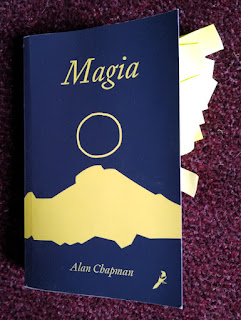John Higgs - The Future Starts Here - Adventures in the 21st Century

But I was mistaken. It's nothing like as simple as that.
Yes, it's a book full of good information about the world today. But it has a larger purpose - to expose the endemic scourge of nihilism in the cultural mainstream. He traces 20th century optimism about the future and how it died in the 1980s, using a lot of examples and building a very convincing case. In his opposition to this trend, he's not advocating blinkered optimism, but 'pragmatic optimism' - looking the future 'in the eye, to truly understand the problems ahead and then adopt an optimistic approach regardless.'
It's no wonder Mr Higgs has been known to quote Salena Godden's superb catchphrase 'pessimism is for lightweights.' Here he is:
The book has 9 sections, amongst which are lengthy refutations of commonly-held fear-ideas. One is that AI is not coming for your job. This is a delightfully underwhelmed deconstruction of the myths about AI; for a start, AI is really not very good. Even in the case of facial recognition software, which has had a lot of money pumped into it for obvious reasons, we get truly pathetic levels of performance:
'South Wales Police experimented with facial-recognition software ... and from May 2017 to March 2018 the technology flagged up 2,685 individuals as people of interest. 2,451 of these proved to be false alarms. In London, the facial-recognition system used by the Metropolitan Police only correctly identified two people, according to information released under Freedom of Information laws in May 2018. Neither of these people was a criminal and no arrests were made.'
Chapter 4, 'The Metamodern Generation', starts off by asserting the differentness of the various post-WW2 generations, using the common definitions of Boomer, Gen X, Millennials (defined as those who came to adolescence around 2000) and Post-Millennials, known as Gen ZZZ by some unkind folk.
The start of that chapter was challenging for me: a tale of law students who were refusing to study rape law and wanted the word 'violate' expunged from their law books. Surely it's not just me, being an old-fart Boomer, who finds this obscenely stupid, and deeply antithetical to anything that can be dignified with the term 'education'?
But if it pushes my buttons to that extent, there has to be more to it than that. Remember, whatever generation you're from, the student politicos? Ambitious individuals who take some issue and whip up support to launch themselves on a political career? This idiocy sounds like the Gen Z version of that kind of social predator, taking some issue that is already in social media and driving it to ludicrous extremes, because basically no-one else will, so it provides a USP for that politico, a handhold on the slippery slope of political mendacity. The people who drive such things will, I imagine, be doing something much nastier in ten years' time.
So that was how I found some way not to condemn a whole generation because of its more idiotic excesses. However, the very fact that such balderdash can exist at all does make me ask what is wrong with Gen Z. And Higgs does a good job of redeeming Gen Z; this is a generation whose values lean strongly towards service. Their hyper-sensitivity may be the main driver behind their commitment to global issues such as Extinction Rebellion, and if the future needs anything, it's people who are driven to serve, to oppose rather than abjectly accept the cynicism of the cultural mainstream.
I ended that chapter feeling decidedly more optimistic about the future; it's in the hands of people who actually care, whose idiocies will fade into history, while they work to preserve and reform the human world.
In that chapter, Higgs introduces us to metamodernism as the philosophy that is replacing postmodernism. We can all breathe a deep sigh of relief at that - the corpse of PoMo has been stinking the place out for a while now. We can now move on from that pretentious anti-science nonsense and the misuse of the word 'problematic' as a noun.
The etymology of metamodernism is encouraging; it's not from 'meta' as in 'overview', but 'from the Greek word metaxy. Plato defined metaxy as being between two contrasting poles. ... The way that post-Millennials can oscillate between being childlike and sensible, or being conservative and liberal, is a ... contemporary example of metaxy'
He quotes one Luke Turner: 'it is important to oscillate between opposing poles rather than choosing one and identifying with it ... the mercurial condition between and beyond irony and sincerity, naivety and knowingness, relativism and truth, optimism and doubt, in pursuit of a plurality of disparate and elusive horizons.'
Astonishingly, this is pretty much the 'Polarian method' as defined by Edred Thorsson in his description of the path of Odin and those who would emulate him. Thorsson writes:
'It is in the eternal ebb and flow, in the dynamic process - unending and without end - that the ultimate synthesis is found - not in a state of being. This is the essence of what I call the "Polarian Method".'
I can't see how we could have got from Thorsson's words to those of Turner, but these interesting times make for strange bedfellows, and in such an exoteric context, Polarian thinking is an excellent antidote to rigid, dogmatic positions.
Higgs does a nice job of trashing social media. Apparently, Zuckerberg at age 19 referred to the first few thousand member of his fledgling Facebook as 'dumb fucks'' for trusting him. Now, we are seeing an exodus from FB, especially among younger users.
About this, Higgs writes: 'The way the platform can be used to trigger negative emotions works as a powerful addictive drug on the Baby Boomer generation, yet this repels the young.'
I'm warming even more to Generation Z!
In the penultimate chapter, 'Fixing Things', the author confronts climate gloom and rejects such positions as the Dark Mountain Project. Some years back, I read a good deal of their stuff and it struck me as, ultimately, selfish and whiney. Saying there is nothing that can be done and that everything is fucked and all we can do is huddle together and weep collectively is not a good way forward on any level as far as I'm concerned. Higgs sees this attitude as a facet of the Gen X tendency to nihilism, which he addresses in the earlier chapter about generational differences. 'Once you adopt that position you no longer need to worry, or keep thinking about the problem, or look for solutions. Giving up is seductively easy, especially as you get older.' There is always reason to doubt, and never a time to give up hope. Higgs sees Dark Mountain founder Paul Kingsnorth's hopelessness as a yearning for an impossible golden age of humans living in a perfect harmony with pristine wilderness. As Higgs puts it, 'Giving up eventually becomes inevitable when what you seek can never be found.' We just have to live with the mess and make the best of it we can. Which will be a lot better than abandoning all effort.
In the final chapter, 'More Than Individual', Higgs muses on where the mainstream's culture of individualism has got us. He quotes Chris Bateman on how, 'once you have cut the ties that were unique to you, you become adrift in the same mass-culture corporate networks as everybody else... Pursuing individuality in this way results in becoming, essentially, the same as everybody else. The background and relationships that were discarded turn out to be the very things that would have made you a distinctive, unique individual.'
This seems obvious to me, but then again I've been involved for years in magical currents some of which articulate 'radical traditionalist' positions. The radical traditionalist argues for small against large, for family and 'organic' community as against corporate and state methods of organizing society. Sadly, the 'organic' bit in 'organic community' is often interpreted along racist lines, ruining the whole argument as far as I'm concerned; who wants to be stuck in a village with a tiny gene pool run by people who hate anyone who is different from them? So it is refreshing to find that the basic idea of the strength of family and local community against the corporate state is gaining currency without the shameful idiocy of racism.
His parting shot is at the recent rise of the populist ultra-right, as 'the twentieth-century world view lashing out and trying to save itself from coming change ... like Canute ordering back the waves.' Let's hope he's right.
One bit of astonishingly good news that I was surprised not to find in this book is about the best projections we now have on the growth of world population. The old projections were based purely on what had gone before, with no accounting for new variables. Those projections leave us with a version of the future with nothing but overcrowded cities, starving people and no wildlife; it's hard to avoid very bad dystopias when thinking about such a relentless march of overpopulation. However, some clever researcher a few years ago worked out that the biggest factor in reducing birth rates is the education of women: the more educated women you get, the fewer children they have. Projecting the curve with this variable increasing realistically, we get a population which peaks over the next century then starts declining*. Without that effect, there would be little cause for hope.
Reading this book was quite a ride for me, as you may have noticed. It changed a few of my ideas for the better, particularly about the generation in whose hands we are leaving the planet. It's a gripping read, and possibly his best book to date. Buy it, especially if you are over 30. In fact, it should be compulsory reading for anyone in that age group.
(*See for instance https://www.theguardian.com/world/2019/jan/27/what-goes-up-population-crisis-wrong-fertility-rates-decline)




Some on the “ultra-right” are looking ahead, to a world where the liberal order has completely broken down and people return to time-tested ways of survival, like tribalism, localism, masculism, warriorism, etc. Rightism is adapted for an environment of scarcity; that’s why it exists. It’s the privileged Western liberals who seem stuck in the 20th century, unable to come to grips with the fact that their cozy post-war order is unsustainable and going away, along with the ideology and breed of person that supported it. You aren’t going to get just the changes you want as the present order unravels; you will have to take the “good” with the “bad”, or redefine what these terms mean.
ReplyDeleteHello Treebeard and thank you for your prompt comment. Judging by the gulf between our views, we are unlikely to convince each other of anything, but I'd like to get a couple of things clear.
ReplyDeleteDoes your version of tribalism involve the exclusion from your community of anyone with different coloured skin?
What do you mean by 'masculism'? That the relationships between men and women should be based on men being physically stronger, so that there is one law for men and another for women?
And 'warriorism': is this some kind of glorification of organized violence?